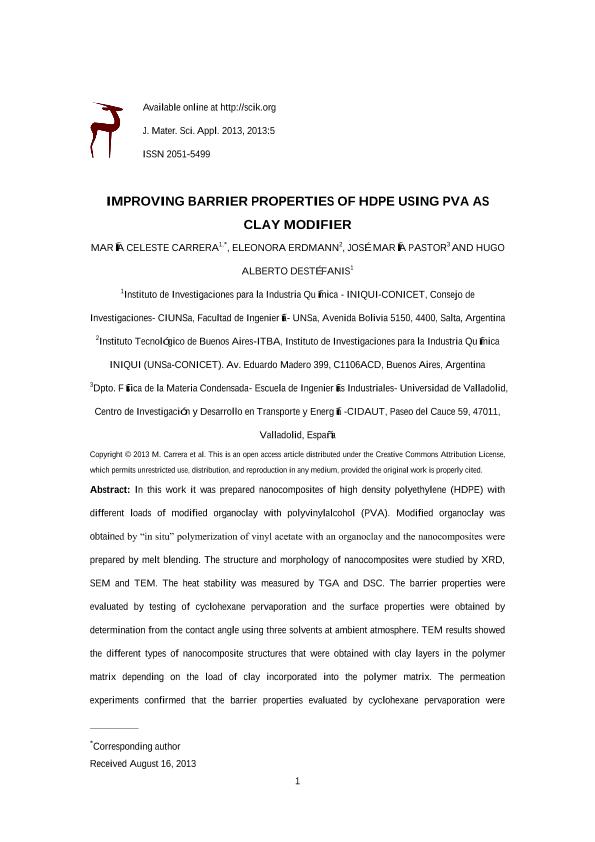Mostrar el registro sencillo del ítem
dc.contributor.author
Carrera, María Celeste

dc.contributor.author
Erdmann, Eleonora
dc.contributor.author
Pastor, José María
dc.contributor.author
Destefanis, Hugo Alberto

dc.date.available
2016-03-10T20:17:01Z
dc.date.issued
2013-10
dc.identifier.citation
Carrera, María Celeste; Erdmann, Eleonora; Pastor, José María; Destefanis, Hugo Alberto; Improving barrier properties of HDPE using PVA as clay modifier; Science & Knowledge Publishing Corporation Limited; Journal of Materials Science and Applications; 2013; 10-2013; 1-18
dc.identifier.issn
2051-5499
dc.identifier.uri
http://hdl.handle.net/11336/4729
dc.description.abstract
In this work it was prepared nanocomposites of high density polyethylene (HDPE) with different loads of modified organoclay with polyvinylalcohol (PVA). Modified organoclay was obtained by in situ polymerization of vinyl acetate with an organoclay and the nanocomposites were prepared by melt blending. The structure and morphology of nanocomposites were studied by XRD, SEM and TEM. The heat stability was measured by TGA and DSC. The barrier properties were evaluated by testing of cyclohexane pervaporation and the surface properties were obtained by determination from the contact angle using three solvents at ambient atmosphere. TEM results showed the different types of nanocomposite structures that were obtained with clay layers in the polymer matrix depending on the load of clay incorporated into the polymer matrix. The permeation experiments confirmed that the barrier properties evaluated by cyclohexane pervaporation were remarkably improved and increased in the thermal resistance for HDPE/ organoclay modified with PVA materials compared with pristine HDPE. Results from all studies showed that the addition of modified organoclay has changed the macroscopic properties of nanocomposites, as compared to that pure HDPE. This can be attributed to the different interaction of PVA with HDPE/filler.
dc.format
application/pdf
dc.language.iso
eng
dc.publisher
Science & Knowledge Publishing Corporation Limited
dc.rights
info:eu-repo/semantics/openAccess
dc.rights.uri
https://creativecommons.org/licenses/by/2.5/ar/
dc.subject
Nanocomposites
dc.subject
Pervaporation
dc.subject
Hdpe
dc.subject
Pva
dc.subject.classification
Compuestos

dc.subject.classification
Ingeniería de los Materiales

dc.subject.classification
INGENIERÍAS Y TECNOLOGÍAS

dc.title
Improving barrier properties of HDPE using PVA as clay modifier
dc.type
info:eu-repo/semantics/article
dc.type
info:ar-repo/semantics/artículo
dc.type
info:eu-repo/semantics/publishedVersion
dc.date.updated
2016-03-30 10:35:44.97925-03
dc.journal.volume
2013
dc.journal.pagination
1-18
dc.journal.pais
Reino Unido

dc.description.fil
Fil: Carrera, María Celeste. Consejo Nacional de Investigaciones Científicas y Técnicas. Centro Científico Tecnológico Salta. Instituto de Investigación Para la Industria Química (i); Argentina
dc.description.fil
Fil: Erdmann, Eleonora. Consejo Nacional de Investigaciones Científicas y Técnicas. Centro Científico Tecnológico Salta. Instituto de Investigación Para la Industria Química (i); Argentina. Instituto Tecnologico de Buenos Aires; Argentina
dc.description.fil
Fil: Pastor, José María. Universidad de Valladolid. Escuela de Ingenierías Industriales. Departamento de Física de la Materia Condensada; España
dc.description.fil
Fil: Destefanis, Hugo Alberto. Consejo Nacional de Investigaciones Científicas y Técnicas. Centro Científico Tecnológico Salta. Instituto de Investigación Para la Industria Química (i); Argentina
dc.journal.title
Journal of Materials Science and Applications
dc.relation.alternativeid
info:eu-repo/semantics/altIdentifier/url/http://scik.org/index.php/jmsa/article/view/1243
dc.relation.alternativeid
info:eu-repo/semantics/altIdentifier/issn/2051-5499
Archivos asociados
